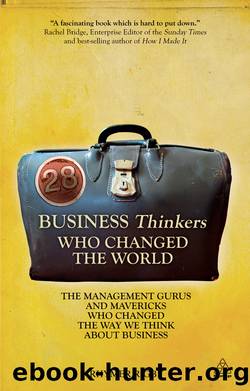28 Business Thinkers Who Changed the World by Rhymer Rigby

Author:Rhymer Rigby
Language: eng
Format: epub
Publisher: Kogan Page Publishers
Chapter Fifteen
Bill Gates
Bill Gates is one of the great drivers of the information revolution of the late 20th century and has done more to shape the personal computer experience than any other person. In 1975, he memorably described a future computer in every home and on every desk and, to a great extent, this vision has come true, largely because of his efforts. The company he founded, Microsoft (MS), makes the Windows operating system that powers over 90 per cent of the worldâs PCs, while its Office productivity suite is thought to be used by something like 80 per cent of the worldâs enterprises. Much of what we take for granted in the world of computing â from document standards to buzzwords â has had its genesis at Microsoft.
All this made Gates the worldâs richest man for an extraordinarily long time â he held the title from 1993 to 2007. Indeed, at one point Gates was so wealthy he was worth over $100 billion, a figure that eclipsed the GDP of most of the worldâs countries. The reason he no longer holds the number one spot is because he has given so much of his fortune to charity. Even so, despite having given $20 billion to charity (second only to Warren Buffett), he is still the worldâs second-richest man, eclipsed only by the Mexican telecoms tycoon Carlos Slim Helú â and even then not by much. Naturally Gates has the ear of global leaders, he is routinely ranked as one of the worldâs most powerful men, and now, thanks to the Bill & Melinda Gates Foundation, he is the worldâs most important philanthropist.
Perhaps strangely given his generosity, neither Gates nor his company enjoys anything like the public affection that his two biggest rivals, Apple and Google, bask in. In fact, while people in the tech community eagerly await Apple and Googleâs every offering, with MS the relationship is more love to hate than love. Geeks seem to go out of their way to disparage MS products; they want to find things wrong with them. The company, the usual line of criticism goes, is anti-competitive. Its monopolistic practices allow it to offer expensive, overpriced and not terribly good software that businesses and consumers have no choice but to buy as well over 90 per cent of computers run on MS operating systems. When real alternatives appear, according to this line of thought, MS crushes them. Nor is it just consumers. Microsoft has attracted plenty of criticism â and the attention of quite a few governments â usually because it is seen as anti-competitive and monopolistic.
While people rarely hate Gates himself, thereâs no doubt that the spark that makes a Steve Jobs (or a Richard Branson) is lacking in Bill. Heâs rich, but heâs not charismatic. Nevertheless, whatever people think about MS, they still buy its products, and it remains a huge and hugely powerful (if not hugely loved) force in the world of technology and business.
Gates was born in 1955, in Seattle, Washington, to wealthy parents.
Download
This site does not store any files on its server. We only index and link to content provided by other sites. Please contact the content providers to delete copyright contents if any and email us, we'll remove relevant links or contents immediately.
Essentialism by Greg McKeown(1223)
Your Next Five Moves by Patrick Bet-David(1211)
Integrated Business Information Systems by Klaus-Dieter Gronwald(1101)
The Science of Rapid Skill Acquisition by Peter Hollins(918)
The Ten Equations That Rule the World by David Sumpter(728)
Improvise! by Max Dickins(698)
Speaking with Confidence by Nick Gold(679)
The Ten Equations That Rule the World: And How You Can Use Them Too by David Sumpter(672)
Idioms & Phrases by Informative Books(661)
How to Write Anything by Laura Brown(659)
Tableau For Dummies by Molly Monsey & Paul Sochan(642)
Voice-Overs for Podcasting by Elaine A. Clark(638)
The Social Skills Guidebook by Chris MacLeod(623)
How to Decide by Annie Duke(606)
Building a Career in Software by Daniel Heller(602)
Pomodoro Technique Illustrated: The Easy Way to Do More in Less Time (Pragmatic Life) by Staffan Noteberg(593)
How to Communicate Effectively With Anyone, Anywhere by Dan Bullock(578)
Perfecting Your Pitch by Ronald M. Shapiro(554)
Copyediting & Proofreading For Dummies by Suzanne Gilad(550)
